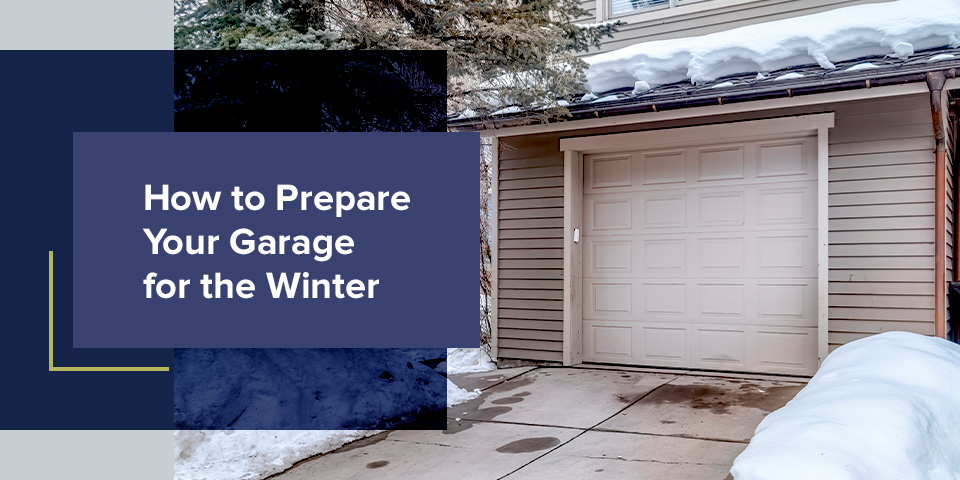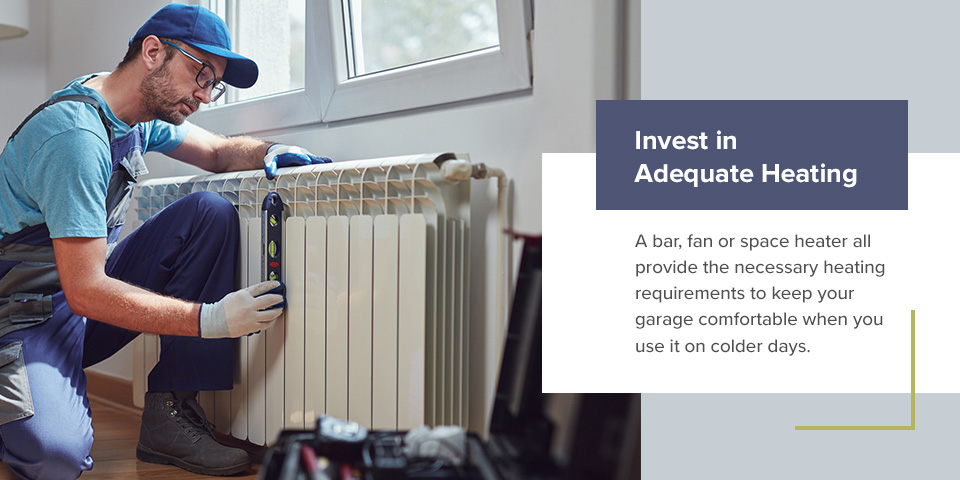
Table of Contents
How to Prepare Your Garage for the Winter
When you’re gearing up for the colder months ahead, you want to do everything you can to prepare your home for the cold and harsh elements. Part of this is making sure your garage is also well-equipped. Your garage is an extension of your home and protects your vehicle and other belongings, so it should receive the same time and attention.
Here are a few tips on how to prepare your garage so it’s ready for winter.
Declutter and Organize
We tend to use our garage for much more than parking a car or two. The garage seems the viable and safest option when the house has no space to keep your precious summer sports gear and other valuable items. Furniture, refrigerators and other household equipment often find their way to a semi-permanent home inside the garage.
In winter, you can anticipate temperature drops that could reach a freezing point. Set time aside in the warmer months to declutter and organize things to avoid any items being damaged by the moisture and cold air in your garage. Sift through smaller items and box up anything that has monetary or sentimental value. Everything else should ideally be gifted or thrown away to save space.
Weatherproof Storage Items
If you have large equipment like furniture or a washing machine, weatherproof it by wrapping it in plastic for extra protection and let it stand on raised platforms. This is a preventative measure — if you should experience flooding in your garage, it will be safe from water damage.
Assign a dedicated spot to hang up wet shoes and clothes before entering your home so it’s not riddled with mud and dirt. Once everything is neatly stored and you’ve dusted and decluttered your garage, sweep and mop the floor for that added touch of cleanliness. Knowing you will be able to find whatever you need with ease should give you peace of mind.
Remove Chemicals and Hazardous Materials
If you’re storing chemicals in your garage, now might be the time to get rid of them. When temperatures fluctuate, the liquid content contracts and expands and may lead to chemical spillage. This is dangerous and should be avoided at all costs.
If you need to store chemicals and other parts like batteries, ensure they are secured, kept out of reach and protected from freezing.
Insulate Your Garage
If your garage isn’t already well-insulated, it could help to do it in advance. Insulating your garage has its advantages, such as:
- Heat retention: Heat and cold transmissions are reduced with insulation since it keeps the heat in and cold out as required.
- Energy conservation: Your energy bill is reduced when you insulate your garage because your HVAC system is less strained to accommodate heating the garage.
- Water heater blanket: By insulating your older water heater with a blanket, you’ll save further costs on energy bills.
- Protect stored items: Your garage is protected from humidity and dampness that can damage your items.
- Noise reduction: An insulated garage reduces noise transmission so you hear less noise pollution from the outside and keep any noise within your garage from leaking out.
Protect the Pipework
When insulating your garage, include the pipework to minimize any potential damage caused by freezing. Fluctuations in temperature and extreme cold could burst the pipes, flooding your garage. This destruction can be costly and is easily avoidable.
By keeping your pipes insulated it will also retain heat and in turn, help save energy.
Invest in Adequate Heating

If your garage is used as a workshop, gym or office unit, you probably use it more often. In this case, you’d want the temperature to be consistent and warmer during the winter. A bar, fan or space heater all provide the necessary heating requirements to keep your garage comfortable when you use it on colder days.
Any pipework is kept at ambient temperature when you use a heater, preventing potential freezing and corrosion.
Seal Cracks and Fix Leaks
Wherever there are cracks in your garage wall, flooring, window frames and garage door, you’ll find drafts can easily enter and make the space inside cold and unpleasant. The increasingly cold and damp air could eventually also damage your stored equipment.
Inspect each section from the floor to the ceiling and walls for cracks and seal them if they’re small enough, including the exterior walls where cracks could be evident. Adding caulk around your windowpanes should help keep it sealed for winter.
If you notice any leaks, find the source and try to fix it or call a plumber to inspect the area in case there’s extensive damage you can’t see or fix yourself.
Seal the Floor
Besides sealing cracks in and around your garage, you will benefit from sealing the floor to prevent corrosion due to salt residue. This salt is used to combat slush from snow and ice and aids in keeping cars on the road. It is brought into your garage by your car and seeps into the floor, causing gradual corrosion of the top layer.
By sealing your garage floor, the surface is more resistant to any form of damage and maintains its durability.
You also decrease the chances of anyone falling and hurting themselves. An epoxy sealant that prevents slipping is especially beneficial for the winter when there’s a higher risk.
Inspect Garage Door Parts
Your garage door is the main component that protects your belongings from the direct impact of rain, sun, snow and other weather elements. Perform a thorough inspection to ensure your door is fully functional and ready for the winter. There could be negative consequences associated with neglecting to maintain your garage door, such as the risk of personal injury or damage to your vehicle.
To help protect and prepare your garage door, perform essential maintenance:
- Weatherstrip the garage door: Weatherstripping provides better protection from the cold and prevents snow and debris from entering your garage. If it is old and worn, be sure to replace it before winter hits.
- Lubricate moving parts: Lubricate any moving parts, like the track and rollers, to ensure your garage door performs optimally despite the low temperatures.
- Repair or replace worn parts: Have a garage door technician inspect your door for any worn parts. To keep you and your family safe, be sure to leave any significant repairs to the professionals.
- Check the opener: Check the opener to ensure a proper connection to the remote and other moving parts.
You can contact a professional garage door company for help inspecting your garage door and making sure it’s ready for the upcoming winter season.
Contact Crawford Door Sales for Your Garage Door Repairs and Installations
At Crawford Door Sales, we are proud to deliver superior service and workmanship on every job we do, big or small. We put you first as our valued customer and ensure every encounter is pleasant, from consultations to repairs and installations.
We look forward to helping you prepare your garage door for the winter so you can rest assured knowing your valuables are protected. Call us at (651) 455-1221 or submit a service request and we’ll take it from there.


